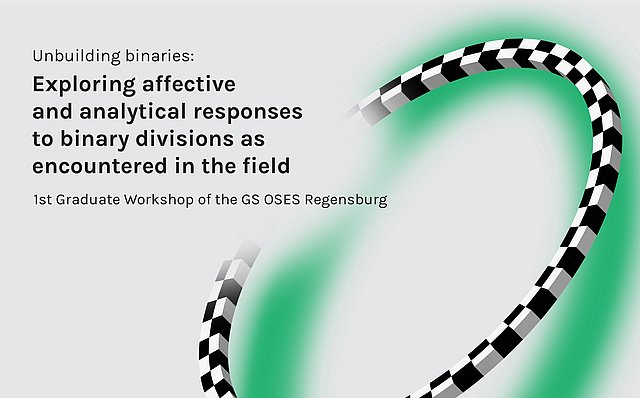You are here:

Unbuilding Binaries: Exploring affective and analytical responses to binary divisions as encountered in the field
1st Graduate Workshop of the GS OSES (UR)
- Beginning:
- Thursday, 26 November 2020
- End:
- Friday, 27 November 2020
1st Graduate Workshop of the Graduate School for East and Southeast European Studies at University Regensburg in cooperation with the Leibniz ScienceCampus “Europe and America”
The graduate workshop is dedicated to the unbuilding of persisting binaries in fieldwork and archival research with particular focus on the affective relationships of the researcher with the field.
The increasing number of theories on social complexity cannot protect the researcher from the fact that certain kinds of polarizations have gained momentum in the last years, as traditionalisms and nationalisms have been becoming stronger. It shows that something is wrong not only with the neoliberal order but also with prevalent theories as they clash with practices, including also research practices.
Discussions around social media have noted the emergence of echo-chambers, where we increasingly tend to communicate with like-minded people while vilifying all ‘others’ who think differently. The middle ground shrinks and antagonisms grow. This dynamic of polarization in contemporary societies is also created by reimposing the binaries that stem from the Enlightenment, based on the division between nature and culture. Even though they have been profoundly critiqued, they linger on in various related and persistent binaries, including gender (women being associated with nature and men with culture), geographical (East/West, North/South), and local/migrant divisions.
Scholars of diverse affiliations have pointed to the performative power of such binaries, criticizing the mechanisms of stigmatization and exclusion and proposing more sophisticated categories that take nuances, contradictions and ambiguities into account. Although some members of the research community may believe that these binaries are already blurred and overcome, for many of those who deal with contemporary society and with the past, the task of ‘unbuilding’ binaries, as encountered in the fieldwork and archival sources, is never finished as long as, for instance, the national community is considered to be ‘natural’. We as researchers have to deal with binaries over and over again, encompassing our implicit assumptions, despite our search for complexities.
This workshop seeks to problematize the process of blurring or dissolving binaries by focusing on the affective relationships we as researchers develop with our fieldwork topics or archival research by including our emotional and bodily responses to binaries in the analysis. To reflect on these relationships may be challenging and frustrating, especially in the context of various forms of intolerance, racism and traditionalist revival, which operate through binaries and further injustice and inequality. This frustration also becomes evident in efforts to deal with the past while the interpretation and representation of historical events is shaped by concerns of the respective present. Our proposition is: let’s think together on how the binaries trouble us and how to use our emotions of discouragement and frustration to do our work of unbuilding. Let’s discuss together the existing theoretical and practical ways of overcoming binaries, think of what criticisms we might offer and what new terms, theories/practices of complexity can be invented to rethink already established theories.
We invite contributions from history, anthropology, literature, sociology, political science, art history, cultural studies, political geography and any discipline within an Area Studies framework, addressing questions such as the following:
- What analytical strategies help you meet the challenges of binary thinking in your respective field of study?
- What ethical dilemmas do scholars face when tackling binary oppositions in their own field of study? How can we take the processes of meaning-making that we study seriously while also questioning sharp delineations?
- What are our affective (bodily and emotional) reactions to binary thinking and are they problematic to deal with? How do these reactions participate in our research? Do these reactions help us to disentangle the binaries that create the basis for inequalities?
- To what extent can specific models of polarization prove productive in plausibly explaining its growing significance? To what extent might they overemphasize (and even performatively construct) polarization, positing a self-reinforcing, teleological dynamic, deemphasising individual political and social agency, and masking people and groups beyond the expected divides?
- How do geographical binaries like East/West or global South/global North influence the frameworks of scientific analysis? How are we dealing with the conceptual boundaries linked to them? In which cases is it justified to apply terms and concepts coined for one region to other parts of the world, in which cases not?
The graduate workshop aims to provide a productive forum for graduate students and early career researchers in particular.
For any questions and more information please contact gsoses.conference@ur.de.
back
